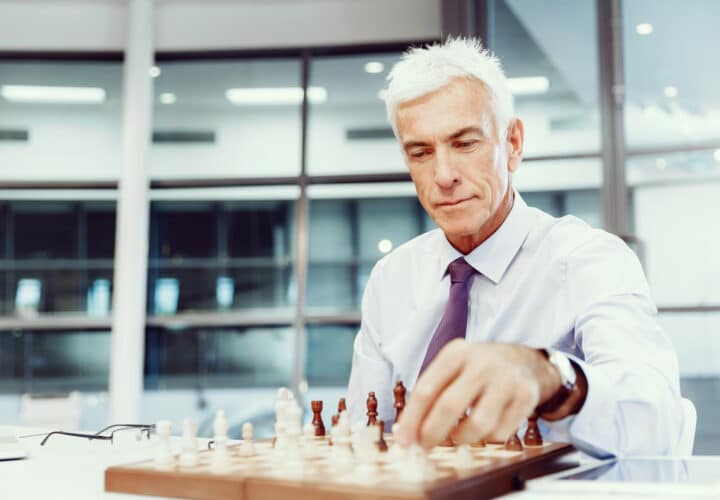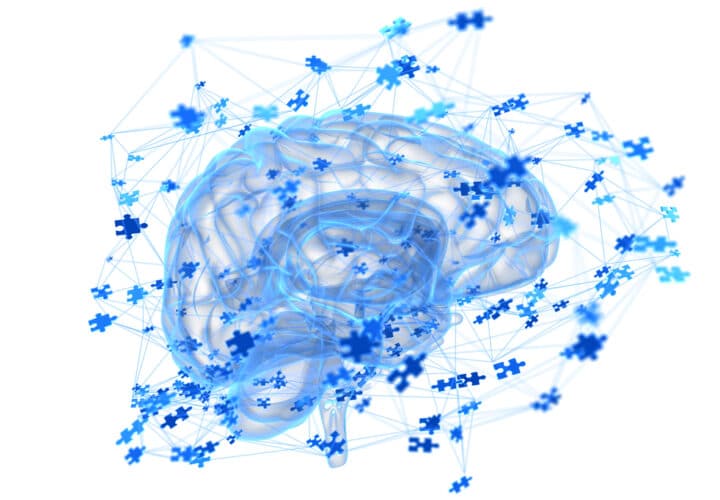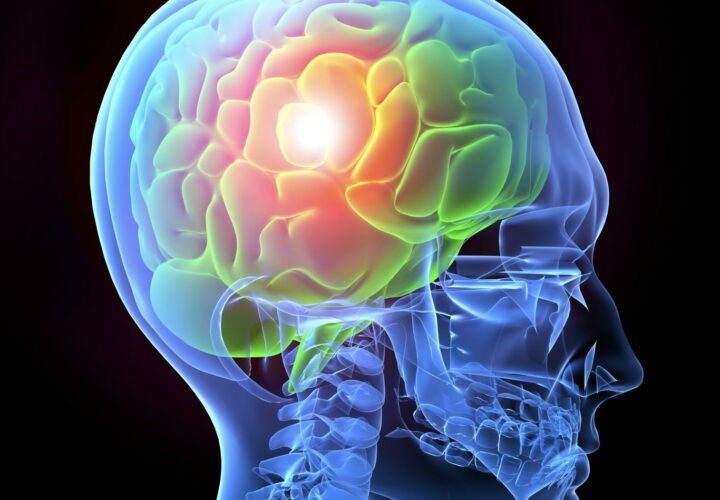Cognitive decline actually starts in our 30s, though we don’t notice the symptoms for several years. Keeping your brain active and preventing dementia isn’t as simple as completing a crossword puzzle, according to Dr. Etienne de Villers-Sidani, a neurologist at McGill University who specializes in brain plasticity, the ability of the brain to rewrite itself depending on changes or demands in the environment. Researchers like de Villers-Sidani say we don’t notice cognitive decline earlier in life because the rest of the brain is able to compensate for the lag in function. One way to prevent early decline and dementia is to work to keep brain passageways functioning by challenging yourself mentally – but that means something different for everyone.
- Learning new things keeps brain passageways active and healthy
- Skills that require sensory processing, like visual and auditory stimulation, are more effective than doing crossword puzzles
- There is no one-size-fits-all recommendation for brain training – it depends on the individual
Watch Video Interview
Being Patient: I’m here with Etienne de Villers-Sidani who’s with McGill University. He’s studying both neuroplasticity and cognitive behavior. Etienne, thanks very much for joining me.
Dr. de Villers-Sidani: My pleasure.
Being Patient: OK, so a lot of what you are doing is looking at neuroplasticity, our brain passageways and how it’s impacted both by disease and different behavioral aspects. Where are we today in the science? How much do we know in terms of changing the pathways inside our brains?
Dr. de Villers-Sidani: So, I think we’ve made great strides over the last few decades in understanding the mechanisms of regulation of brain plasticity. Brain plasticity is the ability of the brain to rewire itself in reponse to changes in the environment or changes in the brain to compensate for disease, dementia or stroke, for example. We know that the rules of neuroplasticity change with age. In fact, it’s much easier as you intuitively know to learn something when you’re a young child learning a second language, for example.
These things, they relate to behavior, so it makes the learning behaviorally relevant. What controls plasticity in young adulthood, these nuclei in the brain that produce these substances, they tend to decline with aging, and even more with dementia. The rules further change as we get older or we develop an illness like Alzheimer’s disease, for example.
Being Patient: OK, so we’re told a lot, learn new things, it’s great for your brain. Keep your brain challenged. It’s really good for what’s happening inside our brains, but can you explain to us, what is happening inside our brains? Why is changing thought challenging ourselves? What’s actually going on physically inside our brains that make it healthy for us?
Dr. de Villers-Sidani: Well, that’s an excellent question and that’s what we’re just figuring out. In fact, I think the more we look at this, the more we realize that almost every aspect of the brain can be changed by training, but not every training does the same thing. If you just look at how neurons look healthier with training: Myelin, the white matter of the brain that’s the insulation around the neurons, it can get thicker and denser with training as well. The cortex can get thicker.
I can list a hundred things that can improve with training but what we don’t know is, is that really helpful for everyday life, and what these changes are really telling us is that the brain is still plastic even very late in life. But we’re not exactly sure what is the right training for a particular person to prevent or to compensate for disease.
And I don’t think there’s going to be a one-size-fits-all solution. I think we need to take people individually and say, so what exactly is harder for that person? What are the weaknesses, the strengths of that person, and really identify what that person needs and tailor treatment.
I think a lot of the studies that have come out recently have been disappointing because we have not really been personalizing treatment to the person and to the fact that the brain is changing with time. But one thing for sure is that I think what we don’t realize is that this decline in cognitive function that happens with age doesn’t really start late in life. It starts much earlier, in the 30s, and we’re not even sure why.
Being Patient: One of the things that you mentioned earlier is that you’re actually using mouse studies but actually starting to transfer some of what you’ve learned in animals to humans. Tell us a little bit about that. What have you learned from your animal studies that now can be translated into humans?
Dr. de Villers-Sidani: In animal models, the advantage we have is that we can look very closely at what’s happening at even a molecular level. We can look at individual neurons, how they can become healthier or not, and then we realize that some compounds in the brain are becoming less and less present with aging and in models of dementia. Now what we’re finding is that there’s a lot of differences even between different mice or different rats that tell us that this variability is very real. By learning what parts of the circuits in the brain, what molecules are missing, then I think we can focus on what are the strategies that will stimulate these very systems that are failing with aging or in the context of dementia. So that’s what we’re doing, is really focusing on specific types of training strategies that will, for example, focus on more attention, more on discrimination of sensory stimulation, and things that really show in animal models widespread effects in the health of brain circuits.
Being Patient: What do we know today based on cognitive studies, things that really help our brain today?
Dr. de Villers-Sidani: Something that really sticks out is the fact that if sensory processing, if the processing of auditory or visual information is degraded in any way, then it’s going to be more difficult for the brain to remember and to make decisions about these things.
When you think about it, there’s no other way for the brain to know about the world than through our senses. So if the information is degraded – let’s say glasses are not well adjusted, or you have a hearing loss – then it’s going to be harder to remember words. It’s going to be harder to make decisions. You’re going to be startled all the time by stimuli because you can’t predict them.
These are all things that we see with aging and with dementia too, so refining these sensory processes, which is not that difficult to do – learning a new musical instrument, learning a new language, it could be more abstract cognitive training tasks that involve pitch discrimination or rhythm discrimination – these things seem to have more impact on brain processing. I would think that the impact would be greater there than say, doing crossword puzzles, which is probably not very effective based on a number of studies.
Being Patient: Transcranial magnetic stimulation. That’s an area that more researchers are looking into and really what it is, is using a magnet to help change the plasticity of your brain, is that correct to say that?
Dr. de Villers-Sidani: Well, we don’t really know exactly what it does, but yes, it’s sending magnetic pulses to the brain to change its ability to rewire itself.
Being Patient: And what do we know about that today? How much has research progressed and where is research headed?
Dr. de Villers-Sidani: Well, TMS let’s call it, transcranial magnetic stimulation, has been used for a number of different clinical populations. A lot of it has been used so far to understand brain function purely, not really for therapeutic purposes. Now it’s relatively new that we’re using it for therapeutic purposes. We don’t really know how to use it, really to help individuals. There’s a lot of good leads though for depression, for ADHD, even for dementia. There’s a lot of research now being conducted to try to see if we can use that strategy, which is non-invasive. It’s relatively cheap to apply to help these individuals, and I don’t think a lot of convincing results are out, but it might be something that could be useful.
Being Patient: On the spectrum of everything that’s being done for cognitive training, where do you think we are? Have we learned a lot in recent years about really how we can help the brain and memory process?
Dr. de Villers-Sidani: What we’ve learned, really, is that many training strategies are not very effective and that we need to be a little bit more careful about doing proper studies to know exactly what works and what doesn’t work.
Being Patient: When you’ve done studies about neuroplasticity and changing the passageways inside the brain, how much can we tell from the scan?
Dr. de Villers-Sidani: Well, we can tell a lot. Again, what we can see is that the brain gets activated in different ways depending on who you are and what your prior experiences are and also if you have a disease or not. For example, someone who is older or has dementia will tend to activate much more of their brain for the same task. Essentially to perform a task, you need to activate more of your brain so there’s a cost to that task so other networks are trying to compensate for the difficulties that you have.
When you train, what you see is that these networks become smaller and smaller. The brain becomes more specialized and more efficient at dealing with and processing this information. So it means that you can more easily be focused on a task, even if there’s noise around you or you have multiple things to do at the same time. So really it’s building a reserve. That’s what we see, that the brain becomes more efficient at processing information and that makes the processing of information more robust, more resistant to interference.
The way I see this is that cognitive training will not treat dementia or Alzheimer’s disease but what it can do, though, is to build a reserve so that you can better compensate for the effect of the disease.
Being Patient: Great, thanks very much.



I have dementia for 13 months now. I keep bysy aroubd the house and yard. Until recently, my bvb husband has been very much supporr. With all he hss going in, he exploded at me. I feel devastated. What can help both of us. No counseling please.